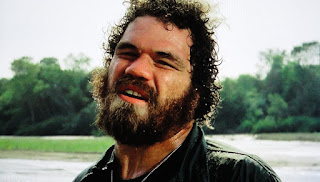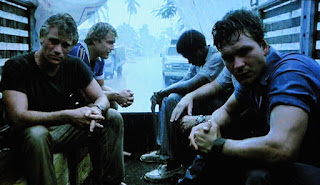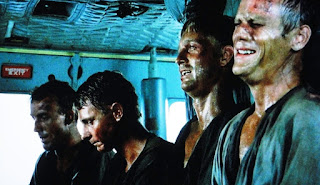"If a man were to know the end of this day's business 'ere it come.
But it suffices that the day will end and then the end be known.
And if we meet again, well then we'll smile.
And if not, then this parting was well made."
-Colonel Jason Rhodes citing Julius Caesar-



But it suffices that the day will end and then the end be known.
And if we meet again, well then we'll smile.
And if not, then this parting was well made."
-Colonel Jason Rhodes citing Julius Caesar-



Director Ted Kotcheff's Uncommon Valor (1983) takes the opposite tact of Ridley Scott's Black Hawk Down and the theme leave no man behind.
In Uncommon Valor, former soldiers are returning for those that were left behind. The prisoner of war (POW) was certainly not uncommon during Vietnam or other world wars. The numbers are murky but following Vietnam alone the sad reality was there were well over two thousand POWs and/or missing in action.

In Uncommon Valor, Frank Rhodes was indeed left behind inches from reaching the safety of a helicopter under intense enemy fire in Vietnam in 1972. His father, Colonel Jason Rhodes, played by Gene Hackman, assembles intelligence and an A-Team to find him and bring him home.
Kotcheff followed up his supremely entertaining and classic tale of an unwelcomed veteran returning home from Vietnam in First Blood (1982) with the relatively exciting, while arguably unoriginal, Uncommon Valor a year later. The aforementioned tale focused on a team of men returning to Vietnam to find a man left behind.

Kotcheff once again expounds patriotically this time with a focus on American POWs and the horrors befallen soldiers and the idea that our great nation take pains to find these men. Uncommon Valor sensitively pays tribute to these men and again, as suggested by the title, pays tribute to their integrity and, of course, valor. Once again, Kotcheff infuses his story and his characters with real humanity as he did for John Rambo in First Blood.
In the film, from 1977 through 1983, haunted by the memory of his son, fearless and determined Colonel Jason Rhodes makes it his sole purpose to find him.
To achieve his story Kotcheff enlisted an immense cast of talent some of whom went on to big things and, like Patrick Swayze (Ghost), sadly are no longer even with us.

For those who might complain of the film's clichéd search and rescue approach Uncommon Valor is an entertaining action war drama led by Hackman and fully supported by Fred Ward, Swayze, Reb Brown, who would go onto early Marvel television acclaim as Captain America long before Chris Evans, and finally one time professional boxer Randall "Tex" Cobb, a personal favorite as a kid. This writer recalled the film fondly seeing it as a teenager.
Aside from a fairly well-paced script and typically fine direction by Kotcheff Uncommon Valor's five producers also come with impressive credentials worth noting. For example, John Milius had a hand in writing the first draft of Apocalypse Now (1979), wrote and directed Conan The Barbarian (1982), Red Dawn (1984) and Farewell To The King (1989) and had a hand in writing Walter Hill's Extreme Prejudice (1987).

Ultimately though, there's no denying the film has an almost A-Team-like quality, thanks in part to an up-tempo and militant score by James Horner, and the rather fitting, when you consider, prime directive of that aforementioned series (1983-1987) and its timing and similarities to the film.
The lack of gravity is somewhat tempered by what's at stake for the men as they put their lives on the line for the final act. Still, the film lacks the menacing and substantive tone of First Blood (that film score complemented by Jerry Goldsmith) to amplify the truly horrific treatment of prisoners of war. As a result Uncommon Valor isn't nearly as somber or dark as it should be, but the film doesn't look to be as serious. It's indeed a product of its time and that shows even more today. Audiences have been far too exposed to significantly more powerful and emotionally sensitive films before and since Uncommon Valor. Kotcheff approached First Blood with a sense of gravity and First Blood still holds up extremely well. Uncommon Valor unfortunately less so.

For those who may have missed Uncommon Valor and wonder how it compares to First Blood---it doesn't. First Blood is the superior of the two Kotcheff war pictures. Despite a great cast, Uncommon Valor simply doesn't hold a candle unable to find just the right tone and mood that the director struck with so deftly in First Blood.
As an action war picture Uncommon Valor is a decent film certain to be forever lost amidst a number of classics from the 1970s and 1980s.

Where First Blood is able to place its razor sharp focus on John Rambo and his sheriff nemesis and resonate powerfully in message, Uncommon Valor must juggle screen time for a fairly large ensemble cast. Character depth is fairly superficial as a result. Even Gene Hackman can't quite rescue that component despite being the lead. The cast is good in their respective parts but don't have a lot to offer as a result of a fairly weak, lacking, even if reasonably well-paced, script.
There's no great probing of humanity here. Emotional depth is sacrificed for an almost superficial and cartoonish brush with potentially vital issues surrounding post traumatic stress and other substantive themes. Political roadblocks and even a cute little love story are cursory, out of place and pointlessly thrown in for good measure.

First Blood manages to surprise and the film tightly moves along viewers to the edge of their seats. Uncommon Valor is missing that element and comes off too familiar and generally predictable. And yet, somehow, it likely served as some inspiration for Missing In Action (1984) or Rambo: First Blood Part II (1985). Rescuing those missing in action (MIA) is the crux of many of these films merely to deliver an action template.
One thing Uncommon Valor holds true is that valor in men today is more uncommon than ever. But it always remains something special within our soldiers.

Uncommon Valor is an average war film that truly isn't uncommonly good enough. In fact, it will remind you just how strong First Blood was as a film and how important Sylvester Stallone was to carrying that picture off.
Uncommon Valor. Writer: Joe Gayton. Director: Ted Kotcheff.

The War: Vietnam (1955-1975).

Notable Dialogue:
"There's a bond between you men... as strong as the bond between my son and me. Of course, there's no bond as strong as that shared by men who have faced death in battle. You men seem to have a strong sense of loyalty, because you're thought of as criminals, because of Vietnam. You know why? Hmm? Because you lost. And in this country, that's like going bankrupt. You're out of business. They want to forget about you. You cost too much, and you didn't turn a profit."

What The Critics Had To Say:
Rotten Tomatoes ranks Uncommon Valor at 56% splat.
Roger Ebert gave the film 2 (of 4) stars calling the picture "a routine formula movie" that "rips off The Dirty Dozen." Ebert added, "In convincing action movies, the actors never seem to anticipate anything. Surprises happen. The results of violence are unpredictable." This film is "irrirtating... cut and dried" and "we're ready for somebody to break in and rescue us from the theatre."
The War Film Blog: A Cautious Nod Of Approval. The paint-by-numbers film is not a must own, but may be worthwhile to diehard fans of the genre, Gene Hackman and/or Patrick Swayze fans or those fans looking for the nostalgia shot.

What Drew Me To The Film:
Despite a DVD only dirty print of the film, the widescreen edition still looks reasonably good. Additionally, don't expect to see this one on Blu-Ray anytime soon, though I've been surprised from time to time. Following a revisit of First Blood on Blu-Ray and in effect falling in love with what Kotcheff had committed to film there as a certified classic I was compelled to give Uncommon Valor another look too. Amazon was there once again.
As a young person I loved this film upon its release and it was likely one of my very first exposures to a young Gene Hackman, relatively-speaking. This may well be the first film by Hackman I enjoyed outside of Richard Donner's Superman (1978) and Superman II (1980).

And despite all of the criticisms of the film's shortcomings in originality, most enjoyed the film quite a bit and by God it's very hard to argue a case against that remarkable cast and an assured Kotcheff coming off the heels of First Blood. Uncommon Valor, today, just doesn't quite hold up in the manner it did when viewed as a youngster. It isn't quite the supremely entertaining picture it once was and the script isn't strong enough quite frankly. It most definitely doesn't hold a candle to First Blood.
On the upside it has Gene Hackman, a United States Marine Corp veteran himself. The cast may be enough to give it a look, but Hackman always elevates the material. Still Uncommon Valor doesn't rank among his best work. Some of my personal favorites include The French Connection (1971), Superman (1978), Superman II (1980), No Way Out (1987) and Mississippi Burning (1988). I even enjoyed The Package (1989), Unforgiven (1992) and Enemy Of The State (1998). There are so many and I still need to check out Francis Ford Coppola's The Conversation (1974).

Unfortunately for Uncommon Valor there are countless other films that take the formula here and create far superior pictures. The Deer Hunter (1978) and Full Metal Jacket (1987) come to mind which include elements or ideas found here but are far superior in execution.
For fans of the war genre and Hackman Uncommon Valor is a mild diversion, but by no means as powerful as I once recalled it to be. In fact, if it's any indicator on where this writer stands, if this generally underwhelming, unessential release were to be issued on Blu-Ray I might think twice before adding it to my collection.
So yes, what drew me to the film was an interest in seeing it all over again. Seeing the picture as an adult it's less captivating even if it's not without its charms.







































